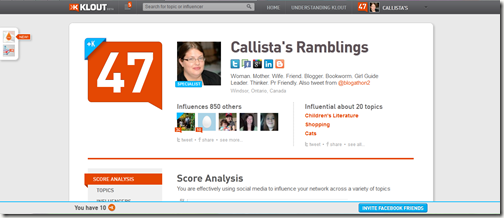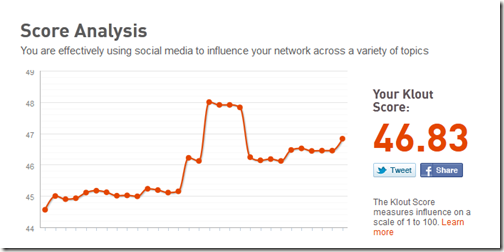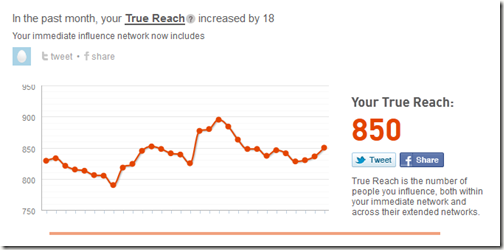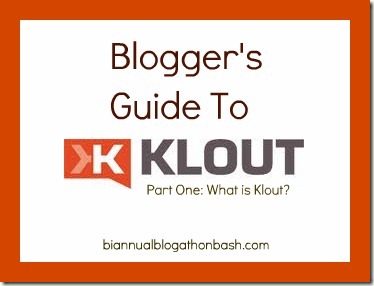I’ve seen lots of questions around the blogosphere about Klout, how to use it, what it means, and if it’s important so I wanted to share what I’ve learned.
What Is Klout?
Klout was started as a way to measure a person’s influence in social media. Klout believes influence has to do with action. I might mention I bought a product on Facebook and a friend may check it out because of me but there is no way to measure that specifically. However if a few friends like my status, or comment, or retweet my tweets for example, then it generally means they found what I said interesting. There is of course still no guarantee they will run out and buy that product, but at least we know they are reading what I wrote.
We believe influence is the ability to drive action. For example, Oprah's opinion on literature has inspired millions to read titles from her book club. But you don't have to be Oprah to have influence. You influence your friend when she listens to a song you recommend on Facebook. You influence your coworker when he checks out an article you posted on LinkedIn and shares it with someone else. Social actions like these are a reflection of influence. - source klout.com
So Klout uses data from your social media profiles to gauge your online influence. It measures this influence on a scale of 1 to 100. A score of 20 is actually the average because as your score increases, it becomes harder to increase.

Above you can see my Klout score for Callista’s Ramblings. I have a separate Klout account for this blog which is currently at 19 as it is still fairly new. Most people will only have one Klout profile.
What Social Networks Are Measured?
To use Klout, you must have at least a Twitter OR Facebook account and you sign in directly with one of those. You can also link up a Google+ account (a profile not a page), LinkedIn and Foursquare. Klout is always working to add more networks and while it won’t affect your score yet, you can link up the following accounts: Facebook Pages, Youtube, Instagram, Tumblr, Blogger, WordPress, Last.fm and Flickr.
After signing in and linking up your desired profiles, your score will be calculated. Whenever you login to Klout, you will see your dashboard which includes your current score and some stats on how your score has changed (the last 1, 7 and 30 days and how many points your score has changed and if it went up or down.)
Although your score is always given as a whole number, your score actually changes by decimal points. For example my score says 48 today but on my profile, it says my score is actually 47.99. I’ve noticed that it rounds up sometimes.
Understanding Your Profile
This is what a profile looks like (my score says 47 because I took the rest of the screenshots a few days ago.)

My account is listed as Callista’s Ramblings but most people have their real name listed there. It’s up to you what you put. Below that are the networks I have linked to my account followed by a small description (taken from my twitter account since that’s what I login with)
Below that it says how many other people I influence and my top 3 topics that I’m influential in (more on that later.) If you scroll down you will find even more information.
Score Analysis

This shows how your score has changed. Usually there are not such big changes but sometimes funny things happen and your score jumps around a bit but I’ve found that if you are consistently active (you don’t have big lulls in your engagement) your score won’t fluctuate too much. If you look at the left side,you can see that the big jumps is still only from 46-48,it’s not like I jumped from 40 to 60.
True Reach

True Reach measures your network. That means the amount of people that are engaging with you (retweeting your tweets, mentioning you on twitter, liking or commenting on your Facebook statuses etc.…) This includes extended networks so if you see on your Facebook news feed that a friend of yours liked my status (even though we aren’t friends) and you like it to, it will count you. You’re extended because you wouldn’t have seen my status if we didn’t have a mutual friend.
Amplification

Amplification has to do with how likely your network is to engage. If you have 100 followers and 80 of those are engaging, you will have a higher amplification score than if you have 1000 followers and 80 of them are engaging.
Network Impact

Network Impact has to do with how influential the people in your network are. If you influence a lot of people who don’t have much influence themselves, then you will have a lower score than if the people you influence are very influential. Think of it this way. If my 14 year old niece retweets my tweet and Justin Bieber retweets my tweet too, which one of those retweets will most likely result in more click throughs, retweets and responses? Justine Bieber has more influence so people pay attention to what he says more so his endorsement of my tweet is worth more.
Topics, Influencers, Lists, Perks and Achievements
On the left side of the profile page is links to more parts of the profile. I will cover Topics and Perks in more detail in the next post of this series.
Influencers just shows you who you influence or who influences you and their Klout score if applicable. You can also add an influencer.
With Lists, you can make lists of Klout users based on whatever you want (like Twitter lists). So you can add people you want to support regularly (we’ll take more about how you do that next week) or say users from a certain group you are in.
Achievements are just little “badges” that you can earn for doing different things around Klout like attaining a Klout score above a certain number, visiting the website a certain number of times, looking at a certain number of profiles etc. They’ve also recently added little quests which you can find on the very left of the website (right against the edge of the screen). I’ve mostly been ignoring these as they’ve been quests for things I’ve already done but would be better for the brand new Klout user.
Klout Style
The final option on the profile it to check out your Klout style.
Klout analyzes what type of social media user you are and puts you on a chart (and shows some of those in your network for comparison).
Some of the styles are:
Specialist: You may not be a celebrity, but within your area of expertise your opinion is second to none. Your content is likely focused around a specific topic or industry with a focused, highly-engaged audience
Socializer: You are the hub of social scenes and people count on you to find out what's happening. You are quick to connect people and readily share your social savvy. Your followers appreciate your network and generosity.
Observer: You don't share very much, but you follow the social web more than you let on. You may just enjoy observing more than sharing or you're checking this stuff out before jumping in full-force.
I’ve seen people say that Klout doesn’t mean anything, isn’t accurate or won’t last long but I believe will become more important as our society moves more into the technology age and we listen more and more to those around us.
Continue to Part Two: Why Klout is Important...
Like This Post? Share Below:
#Bloggers Guide to #Klout Part One - What is Klout bit.ly/IQNMjW via @blogathon2
— Kathleen (@Blogathon2) April 30, 2012



Blogger’s Guide to Klout: Part Two (Why Klout Is Important for Bloggers) - Biannual Blogathon Bash
Friday 22nd of January 2016
[…] Part One: What Is KloutPart Three: Improving Your Klout Score […]
Blogger’s Guide to Klout: Part Three (How to Increase Your Klout Score) - Biannual Blogathon Bash
Friday 22nd of January 2016
[…] Part One: What Is KloutPart Two: Why Klout is Important for Bloggers […]
Mariage Bouches du Rhône
Monday 16th of June 2014
Do you mind if I quote a couple of your posts as
long as I provide credit and sources back to your website?
My blog is in the very same area of interest as yours and my users
would certainly benefit from a lot of the information you present here.
Please let me know if this okay with you. Many thanks!
Kathleen Garber
Monday 16th of June 2014
You may quote with a link credit yes. As long as it's just a quote and not a complete reproduction.
Patricia
Friday 22nd of June 2012
Maybe by this time next year I MIGHT have an idea what this is all about. You have done a great job expaining, but my ``receptors`` aren`t up to snuff!! I have been at this for < 4 months, and have learned a lot ..... still a long way to go!!tks for the help.<br />Patricia, Sugar & Spice & All Things ? Nice
~ The Country Mouse
Tuesday 1st of May 2012
Oh wow! You've really got it all figured out. I tend to ignore Klout for the most part, maybe with your helpful post here I can figure out what to do with it a little better :)